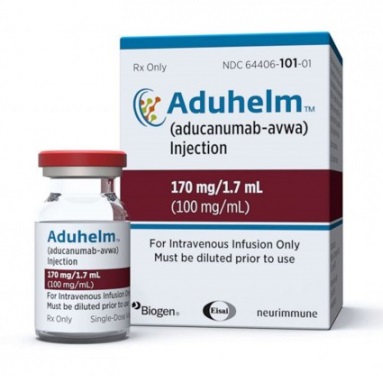Biogen’s first attempt to sell its Alzheimer drug Aduhelm (aducanumab) in Europe has failed.
On Thursday, the European Medicines Agency said it refused to grant marketing approval for Aduhelm, reflecting the November voting results of the Committee for Medicinal Products for Human Use (CHMP).

“Although Aduhelm reduces amyloid-beta in the brain, the link between this effect and clinical improvement had not been established,” the EMA said in a statement.
The EMA also said results from the two major studies of Aduhelm were conflicting and did not show that Aduhelm was effective in treating adults with early-stage Alzheimer’s disease.
The EMA refused the marketing application for Aduhelm because Biogen did not set plans to manage amyloid-related imaging abnormality (ARIA), one of the major side effects of amyloid-targeting antibodies, it said.
“The studies did not show that the medicine was sufficiently safe as images from brain scans of some patients showed abnormalities suggestive of swelling or bleeding, which could potentially cause harm,” the EMA said. “Furthermore, it is not clear that the abnormalities can be properly monitored and managed in clinical practice.”
The EMA concluded that the benefits of Aduhelm did not outweigh its risks and recommended refusing marketing authorization.
On Friday, Biogen said it would seek a reexamination of the CHMP.
Upon the EMA’s refusal of the marketing authorization, the company can request a reexamination of the CHMP opinion within 15 days. The company must submit a document with detailed grounds for the request, and the CHMP must review the opinion within 60 days of receiving the document.
“The marketing authorization application (MAA) included efficacy, safety and biomarker data from a global, multi-study clinical development program which included approximately 3,600 patients in more than 20 countries,” Biogen said.
In June, the company emphasized that the FDA approved Aduhelm as the first Alzheimer’s disease treatment to fight the disease by reducing amyloid-beta plaques in the brain. In addition, the United Arab Emirates (UAE) also approved Aduhelm.
The latest EMA decision will force other drugmakers working on anti-amyloid beta antibody treatments to plan to manage ARIA.
The FDA recommends MRI monitoring for ARIA events before starting the Aduhelm treatment and before the seventh and 12th administration.
More than 50 percent of the patients who experienced the first ARIA had the side effect occurring before the seventh administration, and over 90 percent of the patients, before the 12th administration, in the clinical trials.
Even in the U.S., where Aduhelm is being sold, clinicians do not have a protocol to detect ARIA, judge the severity, and manage the patient’s condition.
Most patients who reported ARIA do not have any symptoms, requiring regular MRI scans to manage it. Unfortunately, it is almost impossible for patients to get MRI monitoring regularly.
Professor Tammie S. Benzinger of radiology and neurological surgery at Washington University School of Medicine in St. Louis, who is working on trials of Alzheimer’s treatments being developed by Biogen, Roche, Lilly, J&J, and Eisai, noted such limitations at the Radiological Society of North America’s 107th Scientific Assembly and Annual Meeting (RSNA 2021) in early this month.
She said more anti-amyloid agents in clinical scenes would lead to more questions from radiologists.

